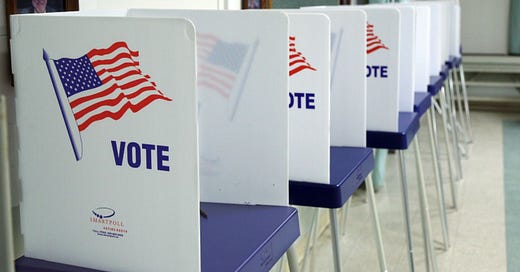Making Decisions in the 21st Century
Food for Thought
Loyalty is a splendid quality that everyone should aspire to—one that sets you apart in the eyes of an employer, supervisor, or even your relatives. However, one could argue that loyalty is, single-handedly, the most detrimental quality a voter could possess. How often do you hear the phrase, "My family and I have always voted for them throughout our lives"? Does that strike you as something to be proud of, or does it call for re-evaluation?
Human beings rely on several mental shortcuts to make decisions. For example, if someone charges at you with a pole, your instinct tells you to duck. Similarly, when you enter a dark room in your house, your hand involuntarily searches for the light switch. In the academic realm, these shortcuts are called heuristics, and for the most part, they are absolute necessities.
Nevertheless, heuristics are vulnerable to our biases. Most of our biases stem from the social environments in which we are raised. To borrow the words of Rutger Bregman, it is not plausible for a human being to relate to and be empathetic toward seven billion people in the world, so instead, we relate to what we can see—our close relatives, the social media accounts we follow, and anything that seems familiar to us. Consequently, our cognitive biases are shaped by what we engage with daily.
Surrounding ourselves solely with liberals or conservatives inevitably tilts our perspective in one direction or the other. Hence, a once-unified society gradually fragments into multiple isolated groups that rarely mingle or share common interests. Supporting this hypothesis, the Carnegie Endowment for International Peace found that American voters are less ideologically polarized, and they harbor deep animosity toward members of the opposing party.
This is hardly what the founders of democracy had envisioned. In essence, the decisions we believe to be deliberate and independent are, in reality, influenced by a spectrum of involuntary factors, including our experiences. Even the most independent decisions are shaped by the people we know, the shows we watch, the newspapers we read, and so on.
Extending this hypothesis to the admirable quality of loyalty may yield unexpected results. For instance, when presented with a bundle of various pens, a person may not care about their choice as long as they can write with one. They might grab the first pen they see and proceed with their work, indifferent to the specifics of each pen. However, what if one of the pens in the bundle held sentimental value? Suppose it was a gift from their parents on their 18th birthday—suddenly, the decision requires more thought.
A choice that initially seemed trivial and effortless now invites deeper contemplation, potentially leading to a more selective approach the second time around. In the context of pens, such a preference may be inconsequential, but in politics, these biases can have severe implications. This is where the phrase, "My family and I have always voted for this party throughout our lives," becomes problematic. The resulting blind faith tends to institutionalize political parties, establishing a client-patron relationship in which voters transition into clients and the political leader becomes the "faithful" patron.
The intersection of human biases with various disciplines, such as economics and political science, remained largely unexplored for a long time, forcing economics, in particular, to rely on fragile assumptions. Things changed in the late 1900s, and cognitive neuroscientists developed significant studies supporting Saliency Theory. Simply put, when choosing a product like a car, a person considers multiple attributes—color, comfort, mileage, and so on. It is unlikely that they value each attribute equally, though.
A family man and father of three children might prioritize comfort and safety above all else, whereas a motorsport enthusiast would likely choose the car with the most horsepower. Such lopsided judgments are exceedingly common and, unsurprisingly, influence political leanings as well. A simple example is election manifestos and campaigns. Despite the persistent outcry for attention to underappreciated policy themes, only a few topics dominate the discourse and prove decisive in elections. For better understanding, when reading a manifesto, we tend to skip complex or jargon-heavy points but pause to engage with those that appear more rhetorical.
The former points rarely make it into campaign debates, while the latter fuel the drama that people anticipate in elections: Discussions on migration and deportation policies often overshadow long-term infrastructure integrity policies. Identity politics and culture wars frequently land in the foreground of social media reels and shorts, whereas inflation and the cost of living crises do not. Blindly voting with limited information can turn an incredibly serious democratic process into a fragile popularity contest.
In reality, however, the predominance of information, personal biases, and individual judgments play a crucial role in elections. Information can be credible or deceptive, just as individual judgments can be data-driven or overconfidence-driven. Over-precision, a form of overconfidence, occurs when individuals believe their knowledge is more precise than it actually is. This phenomenon causes individuals to rely too heavily on their own experiences, shifting their perspective from a broad societal viewpoint to a narrow, individualistic one. Everyone exhibits some degree of over-precision, making misinformation more likely to spread.
A case study from Trentino-Alto Adige (also known as South Tyrol), a region in Italy near the Italo-Austrian border, illustrates this well. The region has both Italian- and German-speaking voters. Before the 2018 Italian elections, misinformation was primarily spread through social media platforms, with Facebook being the dominant one. However, the misinformation was exclusively in Italian. Researchers conducted an analysis to isolate the number of likes on Facebook pages that spread misinformation in each municipality of the region. They discovered that misinformation positively influenced the number of votes cast for populist candidates. German-speaking voters in South Tyrol were significantly less susceptible to the misinformation.
Decades ago in Udaipur, a region in Rajasthan, India, it was common practice for newborns to remain indoors, receiving all their primary healthcare within the confines of the family's limited knowledge. To some extent, the prevalence of contagious diseases in the tropics and an underdeveloped healthcare sector at the time justified such actions. This practice came to be infamously known as the myth of the evil eye.
Effectively, a newborn and a woman recovering from childbirth were denied preventive and curative medical care. Preventive healthcare is essential for achieving herd immunity, and unsurprisingly, maternal and infant mortality rates were extremely high at the time. However, as healthcare evolved, this outdated practice was abandoned as compliance with vaccination drives became mandatory. Fortunately, this ignorant practice has declined substantially, though it has not been totally eradicated.
So, what distinguishes those who complied with vaccination drives from those who resisted? One group remained rigid in their biases, while the other was open to change. Such flexibility is often rooted in skepticism, curiosity, research, and a willingness to listen to those with greater knowledge—in simpler terms, the group willing to change values through reeducation. Although a significantly larger portion of the population is more enlightened today compared to half a century ago, it's important to remember that education is not a static process.
Knowledge is not a fixed stock that, once acquired, lasts for eternity; rather, it evolves continuously, requiring constant learning and adaptation. This is where the misconception of education as merely a means to a high-paying job misleads society. A dynamic education is an absolute necessity to minimize the cognitive biases we harbor.
Needless to say, a certain degree of research should be an essential part of everyone's life, whether one is the president of a nation or an ordinary layperson. To paraphrase Eisenhower, political awareness ought to be a part-time profession for every citizen of a democratic nation. After all, it is one of the most profound instruments for the sustainability of democracy. Answering the question of objectivity presents a slippery slope that requires careful analysis.
One could argue that an unbiased opinion is improbable, as cognitive bias is not a character trait that disappears overnight or even after accumulating legitimate information. Rather, it is a necessary evil—an inherent part of human cognition—that requires modulation. The key lies not in eliminating bias entirely but in refining and fine-tuning it through dynamic education and global awareness. By continuously expanding our knowledge, questioning our assumptions, and exposing ourselves to diverse perspectives, we can cultivate a more balanced and informed way of thinking.





